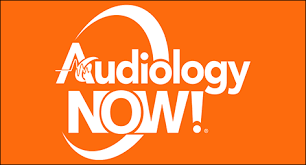By Kathleen Wallace
The American Academy of Audiology’s (AAA) annual conference, AudiologyNow!, took place in the Indianapolis Convention Center in early April. Although four days of lectures addressed nearly every aspect of the audiological scope of practice, one overarching theme emerged this year: How will the field of audiology evolve from here?
This past year has posed various disruptions to the field of audiology, such as how over-the-counter hearing aid legislation will change delivery of services, how the continued interest in personal sound amplification products (PSAPs, also called “hearables”) will guide consumer choice, and how to improve evaluations and interventions to best serve individuals with hearing loss. These questions, along with many others, fueled an exciting dialogue among professionals from around the country.
AAA President Ian Windmill, Ph.D., urged members of the academy to embrace disruptions to the field, including the recently introduced legislation for nonprescription hearing aids. Although these changes may appear as an encroachment on the audiological scope of practice, Dr. Windmill urged that these may actually be beneficial to the field.
Dr. Windmill said hearing healthcare has never been more in the public eye or as highly discussed by health officials, politicians, and consumers than in this past year. This increased awareness could lead to the prioritization of hearing health, as consumers grow more cognizant of the repercussions of hearing loss. Furthermore, the introduction of hearing solutions at various price points and technology levels may improve accessibility. If audiologists were to embrace these alternatives to intervention, they will successfully evolve with the field while simultaneously demonstrating to consumers their dedication to patient-centered care.
This sentiment was echoed throughout the conference’s sessions. Additionally, multiple lectures discussed how audiologists could improve delivery of patient-centered care by improving counseling skills, utilization of self-assessments, and consumer education to shift the locus of control from care provider to joint decision-making between the consumer and the hearing provider.
Lastly, leading professionals in the field encouraged a return to the audiologists’ roots as rehabilitative professionals. In the years since the audiological scope of practice expanded to include the ability to dispense hearing aids, audiologists have slowly shifted their focus from providing rehabilitative services to a device-driven service centered on hearing aids. However, the delivery of unprecedented auditory rehabilitation to foster successful communication strategies will enable our profession to succeed in the face of the many disruptions to hearing technology.
AAA’s willingness to acknowledge the challenges facing hearing healthcare is very promising to its successful evolution as a field. Although the field of audiology is currently experiencing some growing pains, many hearing healthcare professionals are embracing this opportunity to rethink the delivery of care and how to improve patient satisfaction by challenging the status quo.



